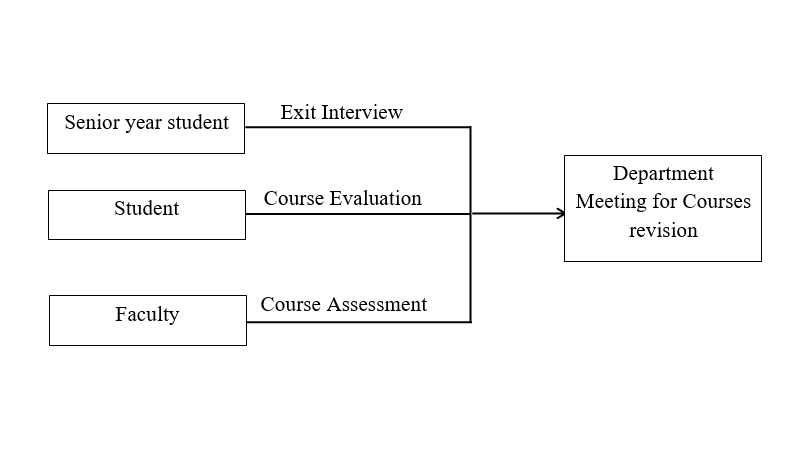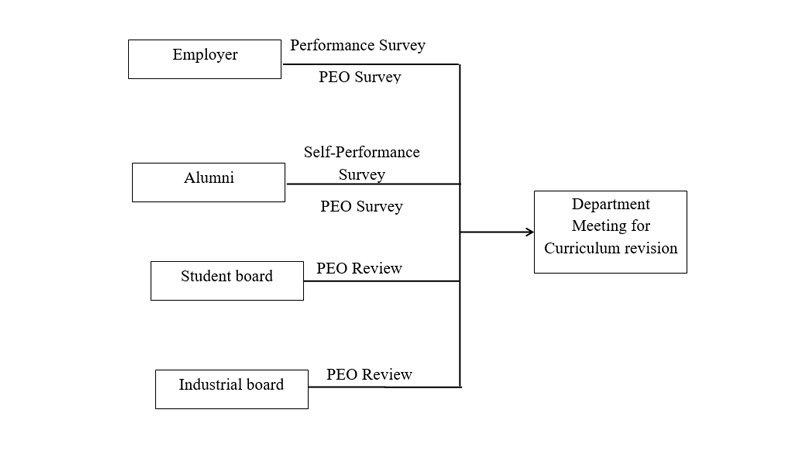หลักสูตรปรับปรุง ปี พ.ศ.2558
แผนการเรียนหลักสูตรวิศวกรรมคอมพิวเตอร์ หลักสูตรปรับปรุง 2558
STUDY PLAN CLICK
ชื่อปริญญาและสาขา
วิศวกรรมศาสตรบัณฑิต (วิศวกรรมคอมพิวเตอร์) ชื่อย่อ วศ.บ.(วิศวกรรมคอมพิวเตอร์)
Bachelor of Engineering (Computer Engineering) B.Eng.(Computer Engineering)
วัตถุประสงค์
-
เพื่อผลิตบัณฑิตที่มีความสามารถและมีความพร้อมในการประกอบวิชาชีพวิศวกรรมคอมพิวเตอร์ ได้อย่างมีคุณภาพ
-
เพื่อผลิตบัณฑิตสาขาวิชาวิศวกรรมคอมพิวเตอร์ที่มีความสามารถเรียนรู้และประยุกต์ใช้เทคโนโลยีใหม่ๆ ที่เกี่ยวข้องกับสาขา วิศวกรรมคอมพิวเตอร์ได้ด้วยตัวเอง
-
เพื่อผลิตบัณฑิตที่มีความรู้พื้นฐานในเชิงวิชาการเพียงพอที่จะสามารถศึกษาต่อในระดับที่สูงขึ้น
-
เพื่อผลิตบัณฑิตสาขาวิชาวิศวกรรมคอมพิวเตอร์ที่มีคุณธรรม จริยธรรม และมีจรรยาบรรณในการประกอบวิชาชีพ นอกจากนั้นยังมี จิตสำนึกในการช่วยเหลือสังคมและในการ อนุรักษ์สิ่งแวดล้อม
Program Education Objective
-
To produce the graduates who are equipped with ability and readiness to work efficiently as professionals in their computer engineering careers.
-
To produce the graduates who are able to learn and apply new technologies that are related to computer engineering filed.
-
To produce the graduates with adequate fundamental knowledge of computer engineering for higher education in engineering, science, and other complementary disciplines.
-
To produce the graduates with high moral and ethical standards in their professional careers as well as caring for the society and the environment.

Student Outcomes
The Student Outcomes of the Computer Engineering program are the same as the 12 learning outcomes of the Washington Accord, stated as following
-
Apply knowledge of mathematics, science, engineering fundamentals and an engineering specialization to the solution of complex engineering problems.
-
Identify, formulate, research literature and analyse complex engineering problems reaching substantiated conclusions using first principles of mathematics, natural sciences and engineering sciences.
-
Design solutions for complex engineering problems and design systems, components or processes that meet specified needs with appropriate consideration for public health and safety, cultural, societal, and environmental considerations.
-
Conduct investigations of complex problems using research-based knowledge and research methods including design of experiments, analysis and interpretation of data, and synthesis of information to provide valid conclusions.
-
Create, select and apply appropriate techniques, resources, and modern engineering and IT tools, including prediction and modeling, to complex engineering activities, with an understanding of the limitations.
-
Apply reasoning informed by contextual knowledge to assess societal, health, safety, legal and cultural issues and the consequent responsibilities relevant to professional engineering practice.
-
Understand the impact of professional engineering solutions in societal and environmental contexts and demonstrate knowledge of and need for sustainable development.
-
Apply ethical principles and commit to professional ethics and responsibilities and norms of engineering practice.
-
Function effectively as an individual, and as a member or leader in diverse teams and in multi-disciplinary settings.
-
Communicate effectively on complex engineering activities with the engineering community and with society at large, such as being able to comprehend and write effective reports and design documentation, make effective presentations, and give and receive clear instructions.
-
Demonstrate knowledge and understanding of engineering and management principles and apply these to one’s own work, as a member and leader in a team, to manage projects and in multidisciplinary environments.
-
Recognize the need for, and have the preparation and ability to engage in independent and life-long learning in the broadest context of technological change.

เรียนวิศวกรรมคอมพิวเตอร์แล้ว ทำอาชีพอะไร
Security Engineer, Web Engineer, Database Administrator, Software Engineer, Network Administrator, System Administrator, IT Consultants , IT Project Manager, Information Officer, System Analysis, Business Analysis, Information Architect, System Developer, Information Coordiantor, System Architech, Testing Engineer, Network Engineer, System Engineer, Application Engineer
ค่าธรรมเนียมการศึกษา : 16,000 บาท (เหมาจ่ายต่อภาคการศึกษา)
วิธีการรับสมัคร
รับสมัครนักศึกษาตามระบบ Thai university Central Admission System (TCAS) (กรุณาตรวจสอบกำหนดการจากเว็บไซต์ของ สำนักทะเบียนและประมวลผล มหาวิทยาลัยเชียงใหม่ )
รอบที่ 1 - รับด้วย Portfolio จากโครงการผลการเรียนดีเด่น โครงการอัจฉริยภาพทางคอมพิวเตอร์ และโครงการนักกีฬาที่มีความสามารถดีเด่น
รอบที่ 2 - รับแบบโควตา
รอบที่ 3 - รับตรงรวม
รอบที่ 4 - รับแบบ Admission
รอบที่ 5 - รับตรงอิสระ
ลักษณะการเรียน
วิชาที่เรียนประกอบไปด้วยวิชาบรรยาย และปฏิบัติ โดยวิชาที่เป็นวิชาชีพจะมีการเรียนปฏิบัติควบคู่ด้วยทุกวิชา เพื่อให้สามารถนำไปใช้งานได้จริง
จำนวนหน่วยกิตในหลักสูตร 140 หน่วยกิต
-
คอมพิวเตอร์ฮาร์ดแวร์ เช่น การออกแบบคอมพิวเตอร์ฮาร์ดแวร์ การออกแบบวงจรรวมขนาดใหญ่มาก (VLSI Design)
-
เครือข่ายคอมพิวเตอร์ เช่น การออกแบบและจัดการเครือข่ายคอมพิวเตอร์ ความปลอดภัยของระบบเครือข่ายและสารสนเทศ
-
เทคโนโลยีสารสนเทศ เช่น ระบบฐานข้อมูลชั้นสูง การทำเหมืองข้อมูลสำหรับวิศวกรรมคอมพิวเตอร์
-
ความฉลาดเชิงการคำนวณ เช่น การวิเคราะห์ข้อมูลภาคดิจิตอล ปัญญาประดิษฐ์
-
คอมพิวเตอร์ซอฟต์แวร์ เช่น วิศวกรรมซอฟต์แวร์
-
สัญญาณและการควบคุม ระบบควบคุมเวลาจริง (Real-time Control) วิทยาการหุ่นยนต์ (Robotic) คอมพิวเตอร์ในระบบการผลิต